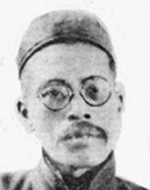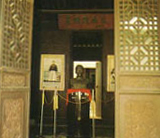Gallery of Philologists


Wang Gwo-wei
1877 (Haining) - 1927 (Peking)
Wang Gwo-wei lived and studied across the divide between Manchu China and Modern China. The disjunction was fatal to him personally, but for a brief period he brought to the young days of the Republic a potent mixture of traditional learning and literary insight, stimulated by contacts with western learning. He studied briefly in Japan in 1901, and on returning to China, taught himself Western philosophy, being especially interested in Schopenhauer and Kant. After a stint of teaching in Sujou, he went to Peking in 1906, specializing in the study of later Chinese poetry (tsz and chyw). After 1907 he concentrated on history, and history in the contemporary sense was his downfall. Wang was politically loyal to the Manchus, and fled to Japan following the 1911 Revolution. There he immersed himself in the study of oracle bones, then a new subject. He returned to China in 1916, and after holding several nonacademic positions, in 1925 became a professor in the College of Literature at Tsing Hua University in Peking. He became involved with the attempt to restore the Manchus, and in 1924 had received an appointment on the Imperial staff. At the approach of the opposing revolutionary army in 1927, he committed suicide by drowning himself in the Kunming Lake in the Imperial precincts of Peking. He was then 50 years old.
Though his nationalism was rigidly backward-looking, his scholarship was thoroughly modern. It had the cardinal quality of objectivity, and did not assume the interest of the state as a starting-point. He wrote on many topics: archaeological, historical, linguistic, and literary. He was among the first to incorporate the new oracle bone material into his scholarship. His reconstruction of the Bamboo Annals is still consulted, and his annotations to the Yi Jou Shu are still cogent. He was the first to firmly identify a Szma Tan authorial portion within the Shr Ji, though he allowed this insight to remain as a footnote to his chronology of Szma Chyen; it was left for Gu Jye-gang to put the authors of the Shr Ji in proper perspective.
At the other end of the chronological spectrum, Wang's studies of the Chinese theatrical tradition and of vernacular fiction, especially the novel Dream of the Red Chamber (Hung-lou Mvng) were of decisive importance in opening up those subjects to scholarly attention. His volume of poetry criticism, the Rvn-jyen Tsz-hwa, departs from standard Chinese utilitarianism; it admits, and celebrates, an aesthetic impulse as such. It defines poetry in a human and not a didactic framework; from the individual out and not from society in. This line of thought continues to be influential, in China and the West.
None of it has aged; all of it remains current and vital. That there is not more of it is one of the supreme tragedies of Sinology in China.
Wang's home in Hai-ning (famous for its tides) is preserved as a memorial.
Readings
- Wang Gwo-wei. Gwan-tang Ji-lin (Collected Writings of Wang Gwo-wei). 1921; 4v Junghwa 1959. The 1959 edition has a brief biographical preface
- Wang Gwo-wei Syenshvng Chywaen-ji. 25v [Taibei] Datung 1976
- Adele Rickett (tr). Wang Kuo-wei's Jen-chien Tz'u-hua: A Study in Chinese Literary Criticism. Hong Kong 1977
- Benjamin Elman. Wang Kuo-wei and Lu Hsün: The Early Years. MS v34 (1979-1980)
- John Marney. Wang Kuo-wei's Jen-chien Tz'u-hua: A Study in Chinese Literary Criticism. JCLTA v15 #1 (1980) 137-141
- Joey Bonner. Wang Kuo-wei: An Intellectual Biography. Harvard 1986
- Marián Gálik. Liang Ch'i-ch'ao and Wang Kuo-wei: The First Impact of Modern Foreign Ideas on Chinese Literary World. in: Gálik, Milestones in Sino-Western Literary Confrontation (1898-1979), Harrassowitz 1986
- Hermann Kogelschatz. Wang Kuo-wei und Schopenhauer: Eine Philosophische Begegnung. Steiner 1986
- James R Hightower and Florence Chia-ying Yeh. Studies in Chinese Poetry. Harvard 1998. The essays on Wang's Rvn-jyen Tsz-hwa in Section 3 are by Yeh.
- Ywaen Ying-gwang. Wang Gwo-wei Ping-jwan. [Shanghai[ Rvnmin 1999
- Antonio S Cua (ed). Encyclopedia of Chinese Philosophy. Routledge 2003. The article on Wang is by Min-chih Chou
Links
- Yin Ruins Biographical Sketch (in Chinese)
30 June 2004 / Contact The Project / Exit to Gallery Index Page

